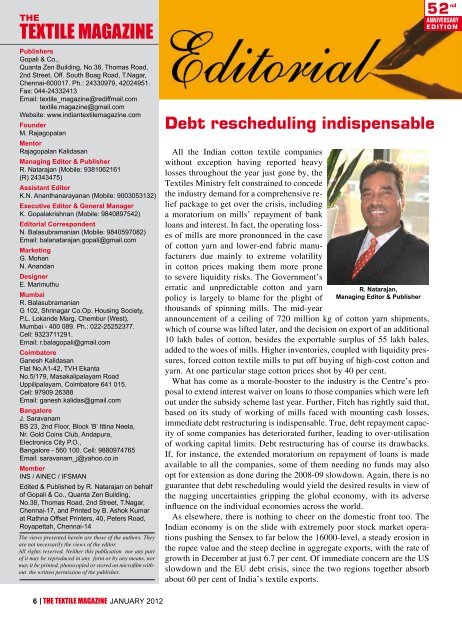policy initiatives - Textile Magazine
policy initiatives - Textile Magazine
policy initiatives - Textile Magazine
Create successful ePaper yourself
Turn your PDF publications into a flip-book with our unique Google optimized e-Paper software.
THE<br />
TEXTILE MAGAZINE<br />
Publishers<br />
Gopali & Co.,<br />
Quanta Zen Building, No.38, Thomas Road,<br />
2nd Street, Off. South Boag Road, T.Nagar,<br />
Chennai-600017. Ph.: 24330979, 42024951.<br />
Fax: 044-24332413<br />
Email: textile_magazine@rediffmail.com<br />
textile.magazine@gmail.com<br />
Website: www.indiantextilemagazine.com<br />
Founder<br />
M. Rajagopalan<br />
Mentor<br />
Rajagopalan Kalidasan<br />
Managing Editor & Publisher<br />
R. Natarajan (Mobile: 9381062161<br />
(R) 24343475)<br />
Assistant Editor<br />
K.N. Ananthanarayanan (Mobile: 9003053132)<br />
Executive Editor & General Manager<br />
K. Gopalakrishnan (Mobile: 9840897542)<br />
Editorial Correspondent<br />
N. Balasubramanian (Mobile: 9840597082)<br />
Email: balanatarajan.gopali@gmail.com<br />
Marketing<br />
G. Mohan<br />
N. Anandan<br />
Designer<br />
E. Marimuthu<br />
Mumbai<br />
R. Balasubramanian<br />
G 102, Shrinagar Co.Op. Housing Society,<br />
P.L. Lokande Marg, Chembur (West),<br />
Mumbai - 400 089. Ph.: 022-25252377.<br />
Cell: 9323711291.<br />
Email: r.balagopali@gmail.com<br />
Coimbatore<br />
Ganesh Kalidasan<br />
Flat No.A1-42, TVH Ekanta<br />
No.5/179, Masakalipalayam Road<br />
Uppilipalayam, Coimbatore 641 015.<br />
Cell: 97909 26388<br />
Email: ganesh.kalidas@gmail.com<br />
Bangalore<br />
J. Saravanam<br />
BS 23, 2nd Floor, Block ‘B’ Ittina Neela,<br />
Nr. Gold Coins Club, Andapura,<br />
Electronics City P.O.,<br />
Bangalore - 560 100. Cell: 9880974765<br />
Email: saravanam_j@yahoo.co.in<br />
Member<br />
INS / AINEC / IFSMAN<br />
Edited & Published by R. Natarajan on behalf<br />
of Gopali & Co., Quanta Zen Building,<br />
No.38, Thomas Road, 2nd Street, T.Nagar,<br />
Chennai-17, and Printed by B. Ashok Kumar<br />
at Rathna Offset Printers, 40, Peters Road,<br />
Royapettah, Chennai-14<br />
The views presented herein are those of the authors. They<br />
are not necessarily the views of the editor.<br />
All rights reserved. Neither this publication nor any part<br />
of it may be reproduced in any form or by any means, nor<br />
may it be printed, photocopied or stored on microfilm without<br />
the written permission of the publisher.<br />
Debt rescheduling indispensable<br />
All the Indian cotton textile companies<br />
without exception having reported heavy<br />
losses throughout the year just gone by, the<br />
<strong>Textile</strong>s Ministry felt constrained to concede<br />
the industry demand for a comprehensive relief<br />
package to get over the crisis, including<br />
a moratorium on mills’ repayment of bank<br />
loans and interest. In fact, the operating losses<br />
of mills are more pronounced in the case<br />
of cotton yarn and lower-end fabric manufacturers<br />
due mainly to extreme volatility<br />
in cotton prices making them more prone<br />
to severe liquidity risks. The Government’s<br />
erratic and unpredictable cotton and yarn<br />
<strong>policy</strong> is largely to blame for the plight of<br />
thousands of spinning mills. The mid-year<br />
R. Natarajan,<br />
Managing Editor & Publisher<br />
announcement of a ceiling of 720 million kg of cotton yarn shipments,<br />
which of course was lifted later, and the decision on export of an additional<br />
10 lakh bales of cotton, besides the exportable surplus of 55 lakh bales,<br />
added to the woes of mills. Higher inventories, coupled with liquidity pressures,<br />
forced cotton textile mills to put off buying of high-cost cotton and<br />
yarn. At one particular stage cotton prices shot by 40 per cent.<br />
What has come as a morale-booster to the industry is the Centre’s proposal<br />
to extend interest waiver on loans to those companies which were left<br />
out under the subsidy scheme last year. Further, Fitch has rightly said that,<br />
based on its study of working of mills faced with mounting cash losses,<br />
immediate debt restructuring is indispensable. True, debt repayment capacity<br />
of some companies has deteriorated further, leading to over-utilisation<br />
of working capital limits. Debt restructuring has of course its drawbacks.<br />
If, for instance, the extended moratorium on repayment of loans is made<br />
available to all the companies, some of them needing no funds may also<br />
opt for extension as done during the 2008-09 slowdown. Again, there is no<br />
guarantee that debt rescheduling would yield the desired results in view of<br />
the nagging uncertainties gripping the global economy, with its adverse<br />
influence on the individual economies across the world.<br />
As elsewhere, there is nothing to cheer on the domestic front too. The<br />
Indian economy is on the slide with extremely poor stock market operations<br />
pushing the Sensex to far below the 16000-level, a steady erosion in<br />
the rupee value and the steep decline in aggregate exports, with the rate of<br />
growth in December at just 6.7 per cent. Of immediate concern are the US<br />
slowdown and the EU debt crisis, since the two regions together absorb<br />
about 60 per cent of India’s textile exports.<br />
52 nd<br />
Anniversary<br />
e d i t i o n<br />
6 | The <strong>Textile</strong> <strong>Magazine</strong> jANUARY 2012






